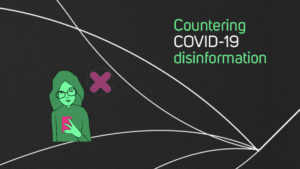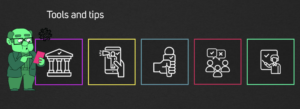The overwhelming amount of information surrounding the COVID-19 pandemic, as well as the equally staggering levels of false information around the coronavirus, led UNESCO and fact-checkers in Latin America and the Caribbean to create a digital hub to combat dis- and misinformation.
“Knowing the growth of fact-checking orgs in the region and because of the suddenness of the pandemic...we needed to respond really quickly. We thought it was important to collate all the information and put it in one platform so it’s easily accessible,” Sandra Sharman, UNESCO project advisor for #CoronavirusFacts: Latin America and the Caribbean, told LatAm Journalism Review (LJR).

UNESCO and Chequeado launched PortalCheck to combat disinformation around COVID-19 and promote critical thinking. (Screenshot)
PortalCheck, available in English, Spanish and Portuguese, aims to be a resource for multiple stakeholders involved in combatting disinformation. The official tagline for the project is “promoting critical thinking.”
“COVID-19 disinformation creates confusion about medical science with immediate impact on every person on the planet, and upon whole societies,” reads the UNESCO policy brief, “Disinfodemic: Deciphering COVID-19 disinformation.”
The hub has resources for educators, institutions and governments, content creators and the general public, with content tailored to each kind of stakeholder. There are instructional videos, podcasts, books, policy briefs, handbooks, tips for sharing and verifying content, and of course, fact-checks.
PortalCheck officially launched on Feb. 11 and the site has more than 32,000 views so far, according to Sharman. That same day, the project hosted its first Digital Lab, a conversation with fact-checkers, UNESCO and EU representatives, social media influencers and scientists.
One of the influencers who was interviewed was Mexican Doctor Víctor Encinas, known on social networks as ‘Doctor Vic’. He has thousands of followers on Instagram, YouTube TikTok and Facebook.
"As we have so much information, currently available to everyone, almost anyone and any media outlet and any content creator can comment on anything, and especially on scientific issues. … So, the opinions, means and treatments, and right now that you're talking about vaccines, almost always have this problem: they are interpretations of scientific studies that are not supported (...), and not everyone knows the levels of scientific evidence,” Encinas said during the panel.
Joining UNESCO as a partner for PortalCheck is Argentine fact-checking organization Chequeado and the LatamChequea network, which includes 35 media outlets in Latin America and the Caribbean.

PortalCheck tailors information about COVID-19 and disinformation to different stakeholders. (Screenshot)
“In 2014, coming from Chequeado, we created and coordinated a network of Latin American checkers, and during 2020 we did a joint project to check disinformation linked to the pandemic, with different initiatives, including a database with articles –checks and explainers– to be able to share our work,” Olivia Sohr, director of impact and new initiatives at Chequeado, told LJR. “Since disinformation is global and crosses borders, sharing our work allows us to check for disinformation faster once it arrives, relying on the work of our colleagues in other countries who have already verified it.”
Most of the content on PortalCheck is from organizations that are part of LatamChequea, as Sohr explained. However, there is content from the U.S. and U.K. on the English version of the hub.
Sharman, from UNESCO, explained that PortalCheck also aims to strengthen fact-checking networks in the region. Additionally, the team behind the project is considering pursuing other important topics like fact-checking and elections.
PortalCheck is part of the global project “#CoronavirusFacts, Addressing the ‘Disinfodemic’ on COVID-19,” which is funded by the EU and implemented by UNESCO. The worldwide project also features policy papers around responses to disinformation, as well as hate speech and discrimination on social media surrounding COVID, Sharman explained. The third part of the project is a multilingual MOOC with the Knight Center for Journalism in the Americas, “Disinformation and Fact-checking in times of COVID-19 in Latin America and the Caribbean,” which is available in Spanish, Portugueseand Guaraní.